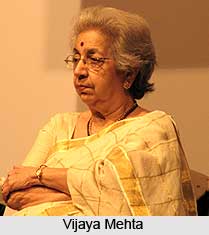 Vijaya Mehta was born in a middle-class Maharashtrian family in Vadodara, Gujarat. Her performance as Desdemona in Shakespeare`s Othello during her final year at Wilson College, Bombay in 1953, impressed Ebrahim Alkazi. He invited her to train under him in Theatre Group. That was the most important ensemble doing English-language plays in Bombay. She accepted, but in 1954 joined Adi Marzban at the Indian Academy of Dramatic Arts. What she learnt from these two directors served as the foundation on which she built her own practice. She first tasted professional Marathi theatre in 1955, when called upon to replace the lead actress in the Mumbai Marathi Sahitya Sangh production of Jhunjarrao, adapted by G. B. Deval from Othello. She married film star Durga Khote`s son, who died young in 1962. She later married Farrokh Mehta, who worked in English theatre.
Vijaya Mehta was born in a middle-class Maharashtrian family in Vadodara, Gujarat. Her performance as Desdemona in Shakespeare`s Othello during her final year at Wilson College, Bombay in 1953, impressed Ebrahim Alkazi. He invited her to train under him in Theatre Group. That was the most important ensemble doing English-language plays in Bombay. She accepted, but in 1954 joined Adi Marzban at the Indian Academy of Dramatic Arts. What she learnt from these two directors served as the foundation on which she built her own practice. She first tasted professional Marathi theatre in 1955, when called upon to replace the lead actress in the Mumbai Marathi Sahitya Sangh production of Jhunjarrao, adapted by G. B. Deval from Othello. She married film star Durga Khote`s son, who died young in 1962. She later married Farrokh Mehta, who worked in English theatre.
In 1960, along with a few close associates like playwright Vijay Tendulkar, actor Madhav Watve, and actor-director Arvind Deshpande, she set up a theatre laboratory called Rangayan, which became a pioneer of the experimental theatre movement in Maharashtra. It aimed at staging scripts by new Marathi writers such as Tendulkar, C. T. Khanolkar, and Mahesh Elkunchwar, and translations or adaptations of contemporary Western drama. As a laboratory it pledged to do only a limited number of shows of each play, however successful, and move on to the next. Some of its acclaimed productions were Ionesco`s Chairs i.e. `Klmrchya` in 1962, Tendulkar`s Mijinkalo mi haralo i.e. `I Won, I Lost` in 1963 and Shantata! Court chalu ahe i.e. `Silence! The Court Is in Session` in 1967, Khano Wars Eksbunya Bajirao i.e. `Bajirao, a Cipher` in 1966, and Elkunchwar`s Holi in 1970. Rangayan closed down in 1972 and Mehta entered mainstream Marathi theatre. The most significant plays she directed and acted in there included Sai Paranjpye`s Jasivandi i.e. `Hibiscus` in 1975, Jaywant Dalvi`s Barrister in 1977 and Savitri in 1981, and Anil Barve`s Hamidabaichi kotbi i.e. `Hamidabai`s Chamber` in 1978. Her sensitive performances as older women in Dalvi`s Sandhya chhaya i.e. `Evening Shadows` in 1973 and Mahesh Elkunchwar`s Wada chirebandi i.e. `Old Stone Mansion` in 1985 were hailed as two of her finest. Her restrained naturalism offered an impressive alternative to the melodramatic style that dominated the mainstream stage. However, the itinerant profession exhausted her physically and creatively.
Exploring new avenues, she turned away from realism to the theatre of costume, poetry, music, and dance. She had already directed man y of the famous plays. Some are Ajab nyaya vartulacha, `Strange Justice of the Circle` in 1973, and Visakhadatta`s Mudra Rakshasa i.e. `Rakshasa`s Signet Ring` in 1975, for the Sahitya Sangh. The former, the first of many collaborative experiments with East German director Fritz Bennewitz, participated at the Brecht Festival, Berlin, in 1973 to high acclaim. Mehta then did Mudra-Rakshasa for the Weimar National Theatre in 1976. In 1979 she directed Kalidasa`s Sakuntala in Marathi. The collaborative production in German went to the Leipzig Theatre in 1980. A Hindi interpretation of Girish Karnad`s Hayavadana came in 1984, the German version staged at Weimar the same year. Mehta directed Karnad`s Naga-mandala in 1991, its German counterpart inaugurating the theatre segment of the Festival of India in Germany in 1992.
Vijaya Mehta was a meticulous director who attends to the smallest detail. Mehta has the reputation of a strict disciplinarian. She also directed films like Smritichitre or `Memory Episodes` in 1983, Rao Saheb from Dalvi`s Barrister in 1986, and Pestonjee in 1987, acting in the first two and as the hostess in Govind Nihalani`s version of Elkunchwar`s Party in 1984. In 1993 she was appointed Executive Director, National Centre for the Performing Arts, Mumbai, a post she continues to hold.




